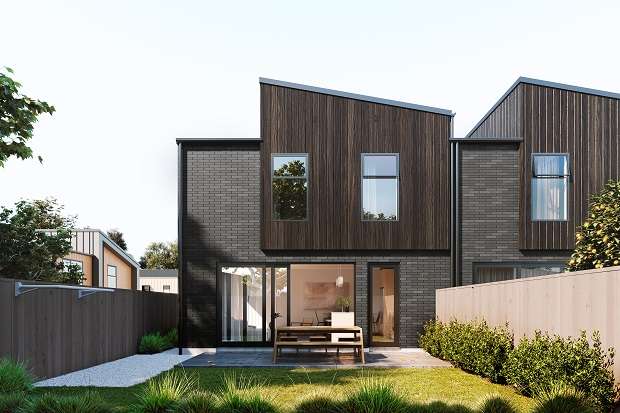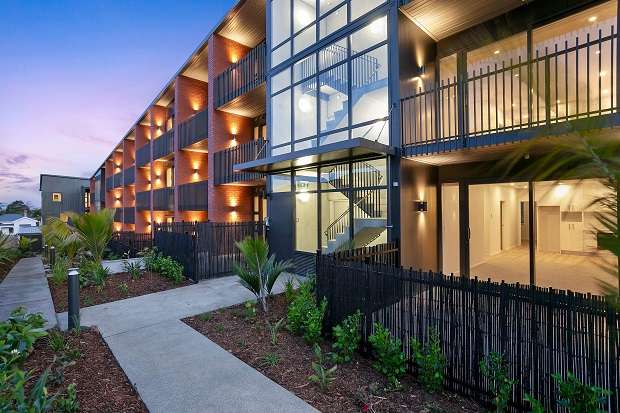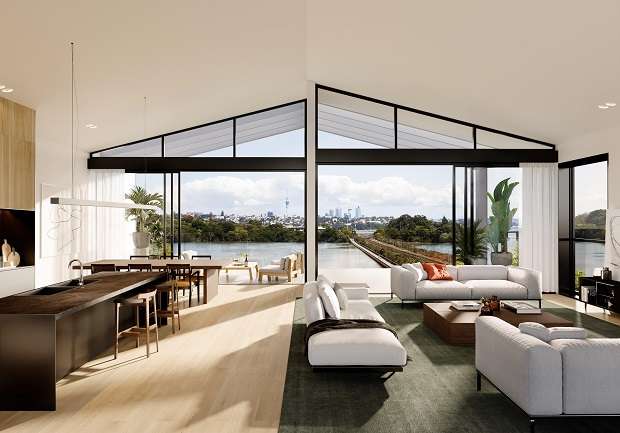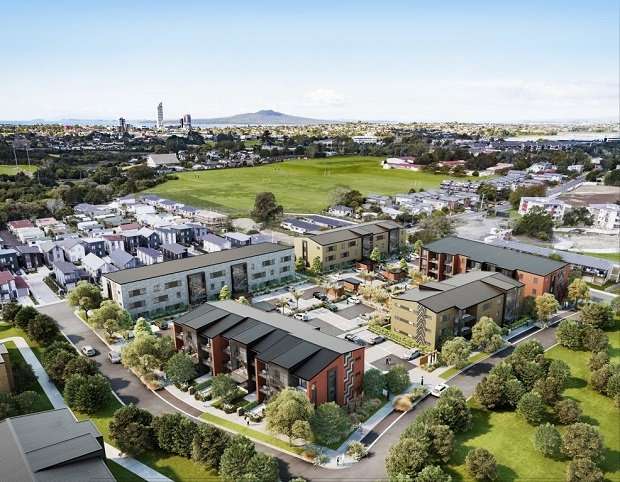The housing market will be looking to fire up again after the nationwide lockdown is lifted on April 27, and the Level 3 restrictions that follow possibly come to an end two weeks later.
Four and a half weeks in lockdown will have highlighted the benefits of buying new for some homeowners: low maintenance, lengthy guarantees, well-thought out living spaces and amenities to hand.
For some buyers, the new homes sector may be able to offer them homes at price points they can't find elsewhere.
OneRoof asked experts in the field how they saw new homes market performing in the coming months. Most saw challenges ahead but they also noted a rise in new home enquiries during lockdown.
Start your property search
Supply and demand
Pete Evans, Colliers national director for residential property development, expects that financially secure first home buyers will have the advantage post-lockdown and will be able to nudge out investors, who had just been coming back into the market.
He predicts they will be the dominant buyers group. “They'll be buying for lifestyle reasons - looking for good locations, close to amenities and transport. They’ve got a bit more time to get into the market, and will be able to use the delays and upswing to get in now. Even if they roll with the cycle, there’re in for medium to long term.”
Evans says developers that had started new buildings through 2018 and 2019 were pretty much meeting their construction programme. And unlike projects in 2016 and 2017, they were less hit by cost overruns and construction delays from the under-supply of workforce.
However, he says it won’t be possible for developers to produce new developments that meet earlier profit margins. “Delays for the Covid-19 lockdown means build costs won’t drop, I see them still going up,” he says.
Because the supply of new buildings will decrease and the cost of construction won’t go down, the economics of supply and demand will kick in.
Need for certainty
Martin Cooper, managing director of Harcourts Cooper and Co, on Auckland's North Shore, says before lockdown sections there was strong interest in new subdivisions and new building consents were at an all-time high. Now, he says, a lot of buyers are sitting on the fence, particularly those who still had properties to sell.
“They see the amber light up ahead, so there’s a bit of hesitation,” he says. “The key thing they want is certainty.”
He points to a 12-terrace apartment development in Glenfield, with two bedroom apartments starting at $685,000 that was launched the week before lockdown. While there was an initial quiet spell by weeks three and four of lockdown, enquiries had picked up again from a mix of first home buyers and investors.

New developments, such as Oneoneroa, in Auckland's Belmont, have sold well right up to lockdown and continue to get enquiries, says Harcourts boss Martin Cooper. Photo / supplied
“Enquiry rate was flooding in, now it’s a gentle flow,” Cooper says. “We’re getting the feeling that interest is still there.
“If a product is sold off the plans there’s 18 or 20 months before it’s completed so it’s easier to make a commitment to a longer time frame.”
“There is pent-up demand, after lockdown people will want to get out, it will be even more desirable to get out. But for now, people are just catching their breath and waiting for certainty to prevail.
And it is not just in Auckland. Hamilton developer Leon Da-Silva made unconditional sales of three properties in a 22 town house project in the city’s outskirts, Frankton, two in the first week of lockdown, after selling some 16 in the weeks leading up. Da-Silva sells mainly by direct email with members of property coaching companies, and says another nine deals are still in play for the properties which start at $520,000 for a two bedroom.
“These are 12 months from completion so we released these early as ‘off-market pocket’ listings,” he says. “We had three deals fall over – they were hospo workers – but when the agents checked with everyone else, they were all on board. We used the Law Society conditions, but it should be a done deal.”
Da-Silva plans to continue releasing other projects as they are ready to market.
Overseas developers have deep pockets
Ray White’s head of projects, Grant Dickson, says that off-shore investors mainly from China, but also Korea, had the massive financial backing to bring large-scale projects to New Zealand and work to bring them to fruition. And it’s offshore buyers that the company is still marketing to, through its offices in Hong Kong, China and Australia.
“For example, a project in Albany, the developer is fully-funded without bringing it to market, they’ve got the resources to fund that development themselves. It takes two years to build and they’re selling them as ready to move in now, they’ll finish in August.
“With the recovery out of China, we’ll see more investment coming out of there to meeting demand and housing shortage.”
Dickson says that online transactions will be very small.
“The majority of apartments in the $1 million or under, when selling off the plans it’s a big ask for someone to wait one and a half to two year to be built, you’ve got to be very flexible on deposits and terms.”
Dickson says that in the past two years, developers have minimised their risk by picking projects in suburban brownfields in central suburbs, prompted by the unitary plan that encourages terraces or four or five level apartments around transport hubs.
“Construction costs are much higher on multi-storey towers and you’ve lower liquidity compared to getting rid of ten townhouses. I have lists of people who will buy in mid- to upper-end locations around train stations like Ellerslie, Panmure, Glendowie or St Heliers.”

Affordable housing, such as this one at 340 Onehunga Mall, will continue to attract buyers wanting to be close to amenities and transport hubs. Photo / supplied
He does point out that lack of infrastructure investment, such unglamorous things as drains and water, is holding back developers buying in some parts of Auckland, and hopes that government investment to rebuild the economy includes that underground stuff as well as houses above ground.
His agents have used new marketing tools to help turn enquiries into sales off the plan, including offering a refundable $1000 deposit for would-be buyers to secure an apartment now before they can get into a display suite post-lockdown.
“I think there are a lot of people who can’t commit to a decision, but the’re just gathering information. It’s unsettling, they’re are concerns about how we will ride it out.”
Top end buyers used to browsing without seeing
Certainly agents selling the upper end new projects market are confident that their buyers are still interested.
“We’re set up for this scenario,” says Suzie Wigglesworth who leads Bayleys Projects. “Off-the-plan selling is always about creating a vision for the buyer because they won’t see the property. So we use all our tricks of the trade like 3D walk throughs, floor plans and we’d already done videos of the display suites.”
Wigglesworth says that while buyer interest took a bit of a hit in the first week of lockdown, projects that have continued to advertise have seen a real increase in enquiries. Sales are conditional on solicitors’ advice, but she said deals are still being done.
“New Zealanders are still engaged, and still interested, although they want to see what happens out the other side. But about 40 percent of our traffic is coming from off-shore, with ex-pat Kiwis.”
She suspects that some who have lived through lockdown without their usual cleaners and maintenance crews may see the need for a lifestyle change to downsize to an apartment with no worries.
Bayleys agent Trent Quinton says that buying has continued despite Covid-19.
“Off the plan, people take a long-term view of this, it’s not an investment it’s a lifestyle choice. They’ve got 12 to 18 months, so that’s time to get out [of their current house] and the market to recover.”
He expects first home buyers will be getting extra support as new KiwiBuild construction comes to market, possibly helped by modular construction.
“Developers are chomping, they’ve lost two or three months. They’ll help those first home buyers as they were the most active even when the top end market struggled to sell, they’ll stimulate that market.”
D
Buyers of upscale projects, such as this one in Orakei, are used to buying off plans and using virtual walk-throughs, says Bayleys' Suzie Wigglesworth. Photo / supplied
In the Mia development aimed at wealthy older buyers in Auckland's Mission Bay, agent MIchael Boulgaris sold a penthouse apartment for $6 million just before lockdown with a second penthouse going in the week before Easter. Boulgaris also has interest in a 42nd floor sky home in the Pacifica, in downtown Auckland, that has a price guide of just under $3 million.
“People are moving from their family homes, they love the area. The cost of maintenance of a house compared to a body corporate with fixed monthly fee is nothing," he says. “There’s a lack of supply of new building for all the ex-pats coming back.”
Builders waiting to get back on the tools
Certainly that’s the aim of government housing organisation Kainga Ora. In regular newsletters to builders and contractors of their projects around the country, deputy chief executive Patrick Dougherty says the organisation is gearing up to reignite its build programme once it is clear what work and activities that can be undertaken at different alert levels.
Since March 16, the organisation has issued 11 construction contracts, 16 new work orders, and 216 consultant contracts, and accelerated planning work for priority housing projects to enable a greater volume to be built.

Government housing organisation Kainga Ora is focused on getting builders back on site and accelerating projects. Photo / Supplied
As part of the government’s Construction Sector Accord, Kainga Ora has focused on retaining a viable sector during the shutdown so they’re ready to restart works and accelerate projects as soon as they’re able.
Kevin Atkinson, chief executive of one of the country’s top the home builders, Generation Homes, expects there to be a bit of a boom as builders get back to work as fast as possible, albeit within strict health and safety guidelines.
He expects them to re-prioritise projects closest to progress or final payments to ensure cash flow, sorely missing for the last month, is taken care of. With fewer tradies allowed on site, Atkinson says there may need to be changes to employment laws or even local by-laws to allow shift, weekend or evening work to meet non-contact distancing guidelines and still stay on schedule.
But the company, which builds some 400 projects from Northland down to Canterbury, has not seen a lack of buyer confidence causing any lost deals. Atikinson says some first home buyers whose KiwiSaver balances had fallen did put projects on hold, but interest is still high in website traffic and enquiries.
“It’s now people’s headspace. It tends to be a personal approach with salespeople, it’s a major transaction. Interest is there, but the capability to visit [a site] isn’t.”
Upscale buyers maybe less shy.
- This content was created in partnership with Kāinga Ora








